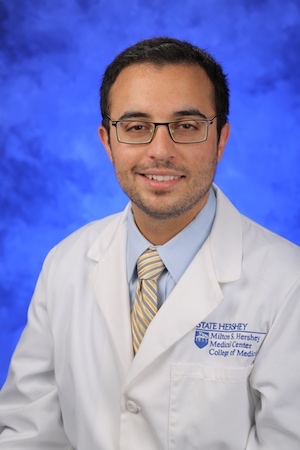Between July and December 2021, Penn State College of Medicine received 310 grants and contracts totaling $64.8 million for research. Faculty will investigate applications of remote health monitoring, blood sugar management and whether olfactory impairment signals Alzheimer’s disease. Read more about select projects below.

Laura Carrel, MA, PhD

Dajiang Liu, PhD, MA
“Variants underlying sex bias in systemic lupus erythematosus”
Investigators: Laura Carrel, MA, PhD, associate professor biochemistry and molecular biology, and Dajiang Liu, PhD, MA, associate professor of public health sciences and biochemistry and molecular biology
March 14, 2022
Grant amount: $240,604 ($441,981 anticipated through October 2023)
Awarded by: National Institute of Allergy and Infectious Diseases
Goal: Systemic lupus erythematosus is an autoimmune disorder that affects more females than males by a ratio of nine to one. Carrel’s study will identify genetic variants on the X chromosome that contribute to this sex bias. She hopes this will be the first study to provide a critical, functional link between associated variants and X chromosome inactivation, which could have a profound impact on understanding mechanisms of lupus biology.

Peter Cygan, MD
“Abnormal bleeding risk in female hemophilia A carriers”
Investigator: Peter Cygan, MD, assistant professor hematology and oncology
Grant amount: $172,670 ($863,350 anticipated through August 2026)
Awarded by: National Heart, Lung and Blood Institute
Goal: Hemophilia A is commonly thought to affect only men, with female carriers only rarely symptomatic. Increasing evidence indicates that female symptomatic carriers are not rare. Cygan will develop a risk prediction model for bleeding tendency in female Hemophilia A carriers, using parameters other than standard coagulation testing.

Andrew Geronimo, PhD
“Home telemonitoring of bulbar function by acoustic measurement of swallowing and speech sounds in amyotrophic lateral sclerosis”
Investigator: Andrew Geronimo, PhD, assistant professor neurosurgery
Grant amount: $468,300
Awarded by: U.S. Army Medical Research and Development Command
Goal: Bulbar function decline in patients with amyotrophic lateral sclerosis impacts speech and swallowing processes, leading to complications, such as malnutrition, dehydration and the inability to communicate effectively. The study team will assess bulbar progression in patients using smartphone-recorded sounds of speech and swallowing. Digital monitoring of health will allow care teams to better respond to clinical changes in bulbar function.

Prasanna Karunanayaka, MS, PhD, MS
“Linking olfactory deficits to memory impairment and Alzheimer’s disease neurodegeneration”
Investigator: Prasanna Karunanayaka, MS, PhD, MS, assistant professor, radiology
Grant amount: $790,767 ($3,928,375 anticipated through June 2026)
Awarded by: National Institute on Aging
Goal: Olfactory impairment may signal Alzheimer’s disease. In this study, Karunanayaka will test an Alzheimer’s disease neurodegeneration model to evaluate how problems identifying and discriminating between odors are related to memory impairment and neurodegeneration and if these issues signal the development of Alzheimer’s disease. Olfactory tests could hold additional promise for early disease detection and prevention in other neurodegenerative diseases, such as Parkinson’s disease.

Michael Murray, MD
“ASERT Central Region FY2021/22 (FY2021/22 Qtr 2-4 and FY2022/23 Qtr 1)”
Investigator: Michael Murray, MD, associate professor psychiatry and behavioral health
Grant amount: $960,000 ($11,920,000 anticipated through September 2022)
Awarded by: Department of Human Services
Goal: This is the continuation of the Central Region Autism Services, Education, Resources and Training (ASERT) Collaborative which funds the ASERT resource center activities, community outreach, education and training, policy recommendations and quality-assurance endeavors for the center. The Central Region ASERT Collaborative works closely with key community partners, such as self-advocacy groups, human service providers and staff and families to provide the most useful information that addresses “real world” concerns for the neurodiversity community. Continuing resources to address the COVID-19 pandemic remain a top priority. ASERT’s COVID-19 resources have been downloaded in over 153 different countries.

Neha Patel, DO
“Continuous glucose monitoring in at-risk newborns”
Investigator: Neha Patel, DO, assistant professor pediatric endocrinology
Grant amount: $306,933
Awarded by: Gerber Foundation
Goal: Hypoglycemia, or low blood sugar, is the most common metabolic disturbance in newborns and has been associated with poor neurodevelopment, executive function and school performance. Patel will assess the safety and feasibility of continuous glucose monitoring and its potential benefits over intermittent glucose monitoring in newborns. Benefits could include decreased needle sticks, fewer missed episodes of abnormal blood sugar levels and improved long-term neurodevelopment.

Ariana Pichardo-Lowden, MD, MEd, MS
“Glucose management clinical decision support to improve outcomes in academic and community hospitals”
Investigator: Ariana Pichardo-Lowden, MD, MEd, MS, associate professor endocrinology and diabetes
Grant amount: $683,402 ($3,939,751 anticipated through November 2026)
Awarded by: National Institute of Diabetes and Digestive and Kidney Diseases
Goal: Dr. Pichardo Lowden and team aim to optimize glucose management among hospitalized patients. Inadequate blood sugar control in the acutely ill is linked to poor clinical outcomes, and this project’s goal is reducing this risk. The team will conduct this work at Penn State Health Milton S. Hershey Medical Center and Penn State Health St. Joseph Medical Center through the implementation of the GlucAlert-CDS, a clinical decision support tool developed at Penn State designed to recognize gaps in glycemic control and provide recommendations to clinicians in real time.

Joslyn Sciacca Kirby, MD, MEd, MS
“Flare assessment for hidradenitis suppurativa”
Investigator: Joslyn Sciacca Kirby, MD, MEd, MS, associate professor dermatology
Grant amount: $209,698 ($629,095 anticipated through March 2024)
Awarded by: National Institute of Arthritis and Musculoskeletal and Skin Diseases
Goal: The goal of this study is to develop, validate and assess criteria for flare in the skin condition hidradenitis suppurativa. Sciacca Kirby’s study will be the first to develop valid and reliable outcome measures for hidradenitis suppurativa flare, including flare activity, long-term control and minimal disease activity, which are assessed in other chronic diseases that periodically worsen.
Other awards
- See grant highlights from previous months here.
- See details on grants awarded to the College of Medicine from 2017 to present here.
